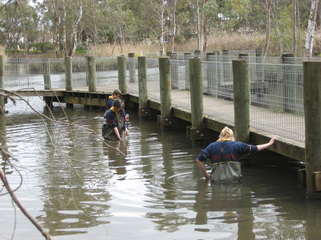What's at the Wetland for You?

There is something for everyone at the Urrbrae Wetland!
This exciting facility can offer authentic and engaging learning opportunities for every age group in any learning area. At the Wetland you can use hands-on activities from water testing to macro invertebrate identification to demonstrate a variety of different concept. Alternatively, you can use the tranquil surroundings and diversity of plants and animals to inspire your class. If you work within education or a community organisation, from the early years through to a tertiary level and beyond, then a visit to the Wetlands could be just what you are looking for.
Below are a number of concepts that can be brought to life at the Wetland but there are many, many more. To discuss how you could explore some of these ideas or another area of your curriculum simply call the Wetland Manager and start creating a unique learning opportunity that is tailored to your needs.
The SciencesWater quality testing
Scientific Method/experimental design The water cycle Oxygen levels in water Aerobic vs anerobic decay Links between biotic & abiotic factors Chemicals in the environment Links between plants and insects Aquatic macro invertebrates Biodiversity Population studies Identifying organisms (birds, plants) Adaptations and survival Habitat variations |
Society & EnvironmentImportance / function of wetlands
Habitat changes and their impacts Indigenous uses of wetlands & organisms Human impact on ecosystems Soil as a resource Sedimentation Erosion Catchment Issues Storm water management Ground water & the water cycle Pollution and trash surveys Urbanisation Natural vs man made wetlands Mapping |
MathematicsCollecting and recording data
Symmetry in nature Measurement Area & Volume Estimating Gathering and manipulating statistics Chance Categorising and classifying Spatial awareness Geometric reasoning |
The ArtsPhotography
Observational drawing, painting Bush art Biological drawing Sculpting and model building Short films Creating music from sound Media presentations Investigation movement & sound Write & perform 'swamp' plays |
English and LOTEWetland stories
Poetry Mini Books or fact sheets Creative writing around a theme Narrative writing Letters about water issues Investigate vocabulary & discussion meetings Practising converstional English Similarities and differences Links between images, sounds and words |
Health and P.E.Bush walking
Animal vs Human movement styles Orienteering Outdoor risk analysis Bush immersion Healthy Habits |
TechnologyWater recycling systems
Solving design problems Designing outdoor structures Selecting and testing materials Designing urban landscapes Designing and use of data probes |
Other AreasResearch methods
Questioning The capabilities within PLP Volunteering |
